King George (15 page)
Authors: Steve Sheinkin

T
he truth is, even Cornwallis didn't know. All summer long, he exchanged angry letters with General Henry Clinton, the British commander in New York City. Like most top British generals in this war, these two guys couldn't stand each other. Clinton wanted Cornwallis to come north to New York, because he was sure Washington was about to attack him there. Cornwallis wanted Clinton to come south to Virginia, because he was convinced the British could capture this important state.
he truth is, even Cornwallis didn't know. All summer long, he exchanged angry letters with General Henry Clinton, the British commander in New York City. Like most top British generals in this war, these two guys couldn't stand each other. Clinton wanted Cornwallis to come north to New York, because he was sure Washington was about to attack him there. Cornwallis wanted Clinton to come south to Virginia, because he was convinced the British could capture this important state.
They finally agreed on a compromise: Cornwallis would take control of a port town on the Virginia coast. That way, British ships could move soldiers quickly back and forth between New York and Virginia.
So Cornwallis started looking for a good port. He picked a tiny town near the Chesapeake Bay. Welcome to Yorktown, General Cornwallis.
N
ow there's just one last piece of the Yorktown puzzle. As Cornwallis was settling in at Yorktown, a fleet of French warships started sailing north from the Caribbean Sea. The commander of the fleet, Count de Grasse, thought he might be able to help with the war. His destination: the Chesapeake Bay.
ow there's just one last piece of the Yorktown puzzle. As Cornwallis was settling in at Yorktown, a fleet of French warships started sailing north from the Caribbean Sea. The commander of the fleet, Count de Grasse, thought he might be able to help with the war. His destination: the Chesapeake Bay.
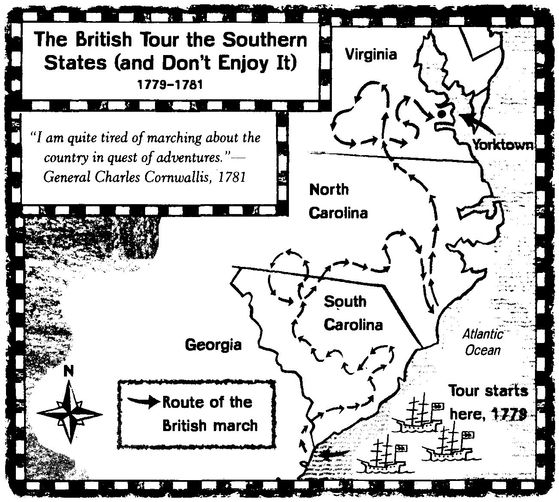
A
nd at last, we're ready to return to George Washington. Last we saw him, his face was bright with excitement. And this is why: down in Yorktown, Cornwallis and his entire army were in a trap. And the best part was, they didn't know it!
nd at last, we're ready to return to George Washington. Last we saw him, his face was bright with excitement. And this is why: down in Yorktown, Cornwallis and his entire army were in a trap. And the best part was, they didn't know it!
It was just a question of timing. If Washington could quickly march his army south to Virginia, he could surround Yorktown by land. And if the French warships took control of the Chesapeake Bay, they could surround Yorktown by water. Of course, all this had to happen before Cornwallis realized the deadly danger of his position. “We have not a moment to lose,” Washington said.
The race was on.
“O
ur destination has been for some time a matter of perplexing doubt and uncertainty,” wrote Dr. James Thacher as he marched south with Washington's army. The soldiers actually placed bets on where they were headed.
ur destination has been for some time a matter of perplexing doubt and uncertainty,” wrote Dr. James Thacher as he marched south with Washington's army. The soldiers actually placed bets on where they were headed.
This confusion was just what Washington wanted. He needed the British to believe he was moving his soldiers into position to attack New York City. He even had his engineers build huge bread ovens around New Yorkâthis helped trick General Clinton into believing the Americans were planning to stay for the rest of the year.
Meanwhile, Washington continued racing his army toward Virginia. As far as he knew, Cornwallis was still at Yorktown. But where was that French fleet? He could get no update from the French naval commander, Count de Grasse. “I am distressed beyond expression to know what is become of the Count de Grasse,” he said. But there was no way to communicate with ships at sea.
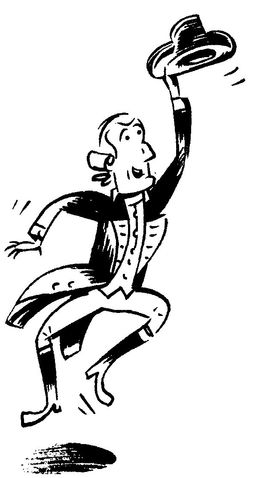
On September 5, just south of Philadelphia, a messenger brought Washington a stack of letters. He opened them and started reading.
At this very moment, General Rochambeau's boat was rowing up to the American camp. Rochambeau looked toward the shore and witnessed a very strange sight:
“I caught sight of General Washington, waving his hat at me with ⦠gestures of the greatest joy.”
As Rochambeau stepped off the boat, Washington ran up to the Frenchman, hugged him, and told him the news: twenty-eight French warships had just arrived in the Chesapeake Bay and were now surrounding Yorktown by water!
Washington rushed his army on to Yorktown and slammed the trap shut on Cornwallis. “We have got him handsomely in a pudding bag,” announced the American general George Weedon.
General Rochambeau
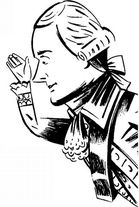
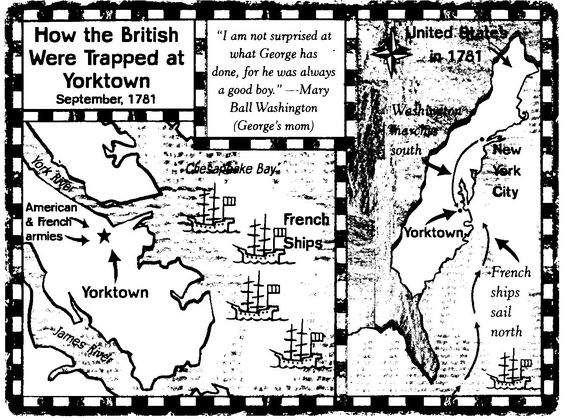
M
ore than seven thousand British and German soldiers suddenly found themselves surrounded at Yorktown. Cornwallis begged Clinton to send help immediately. “If you cannot relieve me very soon,” he wrote, “you must be prepared to hear the worst.” But with French ships controlling the Chesapeake Bay, British ships couldn't get anywhere near Yorktown.
ore than seven thousand British and German soldiers suddenly found themselves surrounded at Yorktown. Cornwallis begged Clinton to send help immediately. “If you cannot relieve me very soon,” he wrote, “you must be prepared to hear the worst.” But with French ships controlling the Chesapeake Bay, British ships couldn't get anywhere near Yorktown.
At least Cornwallis still had his trusted waiter, James Armistead. And in this desperate situation, Cornwallis asked Armistead for a remarkable favorâhe asked Armistead to go spy on the Americans!
Armistead gladly took the job. He snuck over to the American camp and reported to General Lafayette. Now, as one of the country's first “double agents,” Armistead was able to move easily back and forth between British and American camps. He gave Lafayette key intelligence and fed Cornwallis information that was useless or just plain wrong.
Meanwhile, Washington tightened the rope around Cornwallis's neck by inching his soldiers closer and closer to Yorktown. It's fitting that Joseph Plumb Martin, after six long years in the army, was here at Yorktown for the final battle. On October 8, Martin and the rest of the army proudly watched the raising of an American flag, the signal to begin blasting cannonballs into Yorktown. Martin reported:
“About noon the much-wished-for signal went up. I confess I felt a secret pride swell my heart when I saw the âstar spangled banner' waving majestically.”
Joseph Plumb Martin
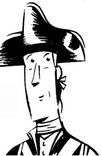
“Huzzah for the Americans!” shouted the French soldiers. Then about a hundred American and French cannons opened fire. The French cannonballs smashed right into buildings in Yorktown. Many of the American cannonballs plopped into the river or landed in empty fields (the French had a lot more practice at this stuff).
The British shot back with everything they had, and the firetailed cannonballs crossed each other in the air.
Washington stood out in the open, watching the bombs explode in Yorktown. An officer named David Cobb urged the commander to be more careful:
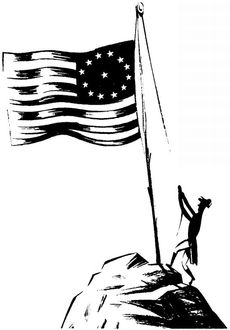
Cobb:
Sir, you are too much exposed here. Had you not better step a little back?
Sir, you are too much exposed here. Had you not better step a little back?
Washington:
Colonel Cobb, if you are afraid, you have liberty to step back.
Colonel Cobb, if you are afraid, you have liberty to step back.
Washington had worked seven long years for this moment. He wasn't going to miss it for anything.
O
ver the next few weeks, the Americans continued moving closer to Yorktown. The men dug trenches and dirt walls to protect themselves from British cannons. For the American soldiers, the biggest danger came from British shells, or bombs that land in the dirt, sit still for a few seconds, and then explode, sending scraps of metal flying in all directions. As a precaution, Washington ordered his men to yell, “A shell! A shell!” whenever they spotted one of these bombs flying into camp.
ver the next few weeks, the Americans continued moving closer to Yorktown. The men dug trenches and dirt walls to protect themselves from British cannons. For the American soldiers, the biggest danger came from British shells, or bombs that land in the dirt, sit still for a few seconds, and then explode, sending scraps of metal flying in all directions. As a precaution, Washington ordered his men to yell, “A shell! A shell!” whenever they spotted one of these bombs flying into camp.
This led to a heated debate between General Henry Knox and Alexander Hamilton. Knox thought the order made senseâWashington was looking out for the lives of his men. But Hamilton was eager to prove his manhood. He claimed it was “unsoldier-like” (kind of wimpy, in other words) to cry “Shell!” every time a bomb landed nearby.
As the two men argued back and forth, two shells screamed down from the sky and smacked the ground near their feet. “A shell! A shell!” shouted soldiers. Knox, Hamilton, and everyone else dove for cover.
But Hamilton didn't feel quite safe enough behind the dirt walls. He crawled behind the much-larger Knox (Knox was about six foot three, 280 pounds) and held on to Knox's thick chest for dear life.
After the shells had exploded harmlessly, Knox stood up, straightened out his uniform, looked down at his young friend, and said:
“Now what do you think, Mr. Hamilton, about crying âshell'? But let me tell you not to make a breastwork
4
of me again!”
4
of me again!”
Other books
My Lucky Catch (University Park #6) by C.M. Doporto
Home Free by Sonnjea Blackwell
Jaded by Tijan
Out of Rhythm (Face the Music Book 1) by Shona Husk
Take Six Girls: The Lives of the Mitford Sisters by Laura Thompson
Second Chances: Novella One by Jo Briggs
La profecía by David Seltzer
Club Justice by McBain, Mara
Confessions of a Naughty Night Nurse by Lily Harlem